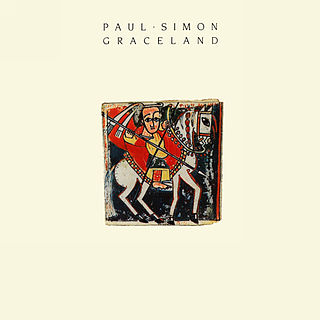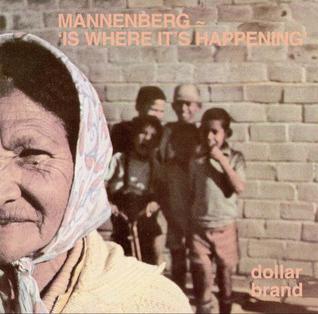Related Research Articles

Hugh Ramapolo Masekela was a South African trumpeter, flugelhornist, cornetist, singer and composer who was described as "the father of South African jazz". Masekela was known for his jazz compositions and for writing well-known anti-apartheid songs such as "Soweto Blues" and "Bring Him Back Home". He also had a number-one US pop hit in 1968 with his version of "Grazing in the Grass".

The South African music scene includes both popular (jive) and folk forms like Zulu isicathamiya singing and harmonic mbaqanga. Other popular genres are Marabi, Kwaito, house music, Isicathamiya, Gqom, rock music, hip hop and Amapiano.

Graceland is the seventh solo studio album by the American singer-songwriter Paul Simon. It was produced by Simon, engineered by Roy Halee and released on August 25, 1986, by Warner Bros. Records.

Basil "Manenberg" Coetzee was a South African musician, perhaps best known as a saxophonist.

Abdullah Ibrahim is a South African pianist and composer. His music reflects many of the musical influences of his childhood in the multicultural port areas of Cape Town, ranging from traditional African songs to the gospel of the AME Church and Ragas, to more modern jazz and other Western styles. Ibrahim is considered the leading figure in the subgenre of Cape jazz. Within jazz, his music particularly reflects the influence of Thelonious Monk and Duke Ellington. He is known especially for "Mannenberg", a jazz piece that became a notable anti-apartheid anthem.
Christopher McGregor was a South African jazz pianist, bandleader and composer born in Somerset West, South Africa.
Johnny Mbizo Dyani was a South African jazz double bassist, vocalist and pianist, who, in addition to being a key member of The Blue Notes, played with such international musicians as Don Cherry, Steve Lacy, David Murray, Finnish guitar player Jukka Syrenius, Pierre Dørge, Peter Brötzmann, Mal Waldron, fellow South African Dollar Brand, and Leo Smith, among many other prominent players.
Robert Edward Jansen was a South African musician. He was born in Cape Town, South Africa.

"You Can Call Me Al" is a song by American singer-songwriter Paul Simon. It was the lead single from his seventh studio album, Graceland (1986), released on Warner Bros. Records. Written by Simon, its lyrics follow an individual seemingly experiencing a midlife crisis. Its lyrics were partially inspired by Simon's trip to South Africa and experience with its culture. Released in August 1986, "You Can Call Me Al" became one of Simon's biggest solo hits, reaching the top five in seven countries.
Mountain Records is a record label started in Cape Town, South Africa in 1980 by Patrick Lee-Thorp.
Cape jazz is a genre of jazz that is performed in the very southern part of Africa, the name being a reference to Cape Town, South Africa. Some writers say that Cape Jazz began to emerge in 1959 with the formation of The Jazz Epistles, many of whom were from Cape Town, including Abdullah Ibrahim, then known as Dollar Brand. Cape Jazz is similar to the popular music style known as marabi, though more improvisational in character. Where marabi is a piano jazz style, Cape Jazz in the beginning featured instruments that can be carried in a street parade, such as brass instruments, banjos, guitars and percussion instruments.
South African jazz is the jazz of South Africa.

Carlos Ward is a funk and jazz alto saxophonist and flautist. He is best known as a member of the Funk and disco band BT Express as well as a jazz sideman.
Beatrice "Sathima Bea" Benjamin was a South African vocalist and composer, based for nearly 45 years in New York City.
Makaya Ntshoko is a South African drummer.

"Mannenberg" is a Cape jazz song by South African musician Abdullah Ibrahim, first recorded in 1974. Driven into exile by the apartheid government, Ibrahim had been living in Europe and the United States during the 1960s and '70s, making brief visits to South Africa to record music. After a successful 1974 collaboration with producer Rashid Vally and a band that included Basil Coetzee and Robbie Jansen, Ibrahim began to record another album with these three collaborators and a backing band assembled by Coetzee. The song was recorded during a session of improvisation, and includes a saxophone solo by Coetzee, which led to him receiving the sobriquet "Manenberg".
Yarona is a 1995 jazz album by South African pianist Abdullah Ibrahim and his group Ekaya, recorded live over two nights at Sweet Basil Jazz Club in Greenwich Village, New York City. Yarona was released on the Enja label.

Hometalk is the second album by South African Afropop fusion band Mango Groove. The album was released in November 1990 by Tusk Music. It went gold upon release in South Africa, and has since reached platinum status. The title track, "Hometalk", was released as a single, followed by "Island Boy", "Taken for a Moment", and "Moments Away". The band recorded music videos for all four singles. One song, "We Are Waiting", was released several months early, in advance of Nelson Mandela's release from prison.
Rashid Vally was a South African music producer and record shop owner. He ran a record shop in downtown Johannesburg, and produced langarm and jazz music. He had a successful collaboration with pianist Abdullah Ibrahim, including the production of "Mannenberg" (1974), a piece which became associated with the movement against apartheid. Scholar Gwen Ansell described his As Shams label as giving "a voice to modern jazz" in 1980s South Africa.

Eike Moriz, better known as Ike Moriz, is a German-South African singer, songwriter, musician, record producer and actor. He has released 20 albums in the indie rock, pop, Latin, easy listening, dance, lounge, blues, jazz and swing genres.
References
- ↑ "Morris Goldberg's Urban Jazz Band (1975)". Electric Jive. 13 November 2009. Retrieved 1 May 2022.
- ↑ "South African Jazz At the Southampton Arts Center". The East Hampton Star . 12 October 2017. Retrieved 1 May 2022.
- ↑ Scancarelli, Derek (1 August 2018). "You Can Call Him Morris Goldberg -- Paul Simon's South African Penny Whistler". Forbes . Retrieved 1 May 2022.
- ↑ Woodwinds | Morris Goldberg, Yamaha.
- ↑ "Bio". Ojoyo. Retrieved 1 May 2022.
- ↑ "Goldberg, Morris (Mo-G) (South Africa)". music.org.za. Retrieved 1 May 2022.
- ↑ DeMott, Benj. First of the Year: 2009. pp. 161–162.
- ↑ "Mannenberg-Is Where It's Happening | Credits". AllMusic. Retrieved 1 May 2022.
- CD - Jazz in Transit - Live concert re-issue. 2006